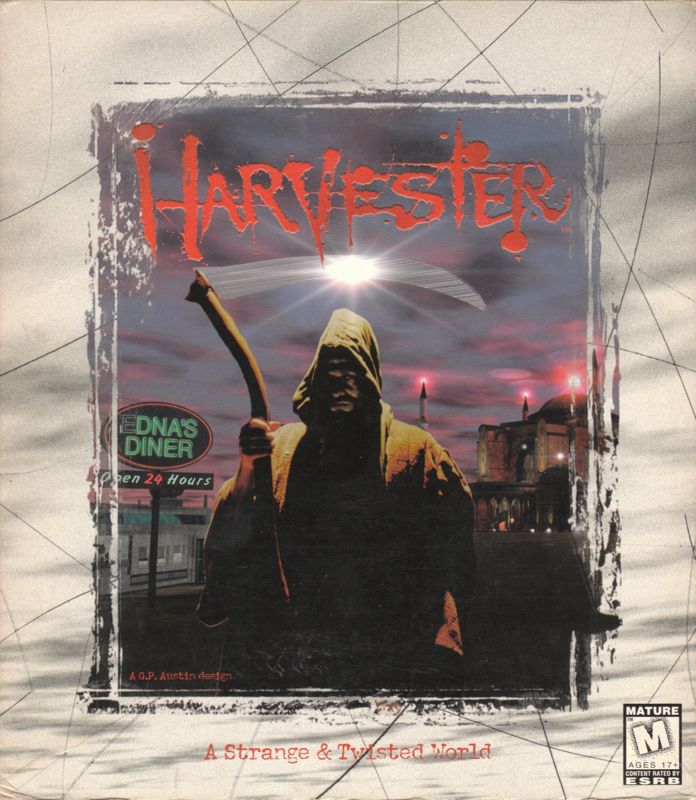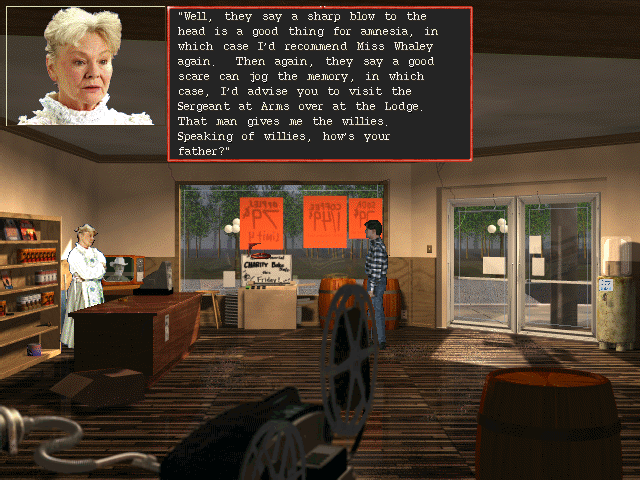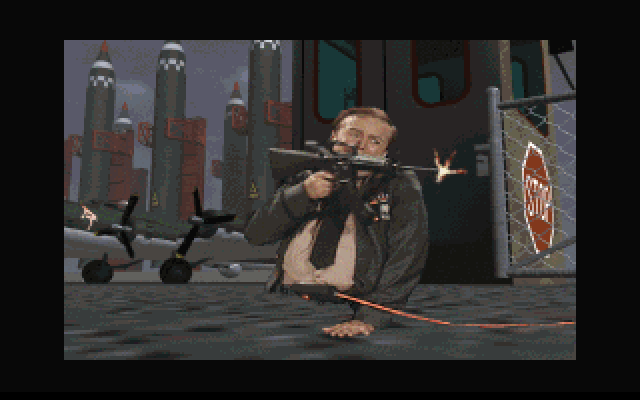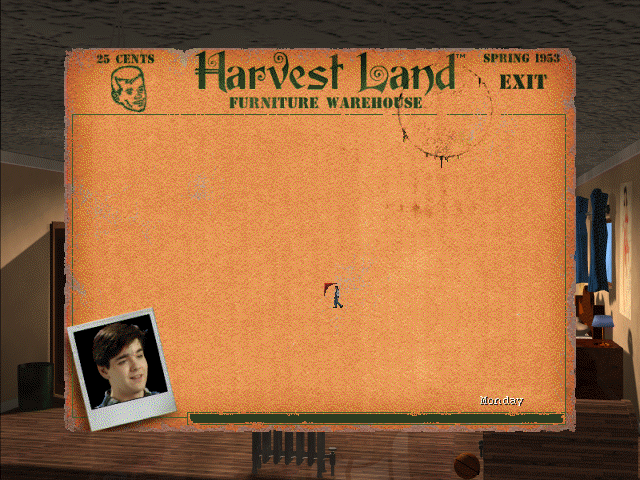Retro Replay Review
Gameplay
Harvester unfolds as a classic point-and-click adventure with a macabre twist. You guide amnesiac protagonist Steve Mason through the eerie town of Harvest, using a simple cursor to examine environments, collect items, and solve puzzles. Interaction “hot spots” light up to show where you can click, and the inventory bar lets you combine or examine objects to unlock new pathways. While most puzzles follow the genre’s familiar logic—finding keys, mixing chemicals, or trading items—the occasional combat-oriented challenge feels more like a scripted gimmick than a truly dynamic system.
(HEY YOU!! We hope you enjoy! We try not to run ads. So basically, this is a very expensive hobby running this site. Please consider joining us for updates, forums, and more. Network w/ us to make some cash or friends while retro gaming, and you can win some free retro games for posting. Okay, carry on 👍)
Combat in Harvester is strictly puzzle‐based. The weapon icon appears only at predetermined moments, forcing you to brawl or shoot your way out of confrontations that are integral to the plot. These sequences play out like mini-games: timing, target selection, and a touch of luck determine whether you advance or must retry. For some players, this break from pure adventuring adds variety; for others, it interrupts the flow and underscores the game’s uneven design.
Dialogue and investigation form the core of gameplay. Talking to dozens of bizarre townsfolk unearths clues, often wrapped in cryptic hints or disturbing humor. You’ll revisit familiar locations multiple times, as new items or information open previously locked areas. Although the adventure is relatively short—around four to six hours for a focused playthrough—its reliance on backtracking and pixel-hunt puzzles can extend your playtime significantly.
Graphics
Visually, Harvester is a relic of the mid-’90s FMV era. The backgrounds are pre-rendered still images, richly detailed with period signage, worn furnishings, and shadowy alleyways. These static scenes establish a tense, oppressive atmosphere, though they sometimes feel flat compared to modern environments. Character sprites are digitized from live actors, pasted over the backgrounds in a slightly jittery fashion that may strike players as awkward or uncanny.
The live-action cut scenes are the game’s most controversial hallmark. Shot on a modest budget, they feature earnest performances and occasionally campy dialogue. The low resolution and grainy video quality now read as retro charm rather than polished horror. While some may scoff at the cheesy special effects and over-the-top acting, others will find that the FMV sequences heighten the unsettling tone by placing real faces in an absurd, blood-soaked narrative.
Sound design complements the visuals with low-fidelity voice clips, dramatic music stings, and sudden ambient noises. Doors creak, footsteps echo, and distant screams punctuate your exploration. Though the audio quality can be tinny, its dramatic delivery—especially during cut scenes—reinforces the game’s pulpy horror aesthetic and keeps you on edge.
Story
Harvester’s narrative begins in 1953, when Steve Mason awakens in Harvest with zero recollection of his identity. The townspeople insist that he belongs to their community—and to a shadowy organization known as the Order of the Harvest Moon. As Steve probes deeper into Harvest’s secrets, he encounters increasingly deranged personalities: a butcher with a taste for more than meat, a cheerful housewife with dark hobbies, and a cult leader with apocalyptic ambitions. Each conversation and puzzle peels back another layer of the town’s twisted rituals.
The writing oscillates between grim satire and outright horror. Dialogue is often exaggerated—villagers trade pleasantries before gleefully recounting murder sprees—and the plot twists are so lurid that they border on the absurd. Yet it’s this very excess that gives Harvester its cult appeal. The story doesn’t merely reveal a dark secret; it drags you through a carnival of grotesque spectacles until the true horror—about Steve’s own past—lands with shocking force.
While the narrative’s pacing can feel uneven, the climactic revelations are memorable. The game explores themes of identity, free will, and the banality of evil under a veneer of small-town Americana. Despite some dated tropes and occasionally stilted dialogue, Harvester delivers a story that lingers in the mind long after you finish the final cut scene.
Overall Experience
Playing Harvester today is like stepping into a digital time capsule of horror gaming’s FMV heyday. The interface feels primitive, the graphics rough around the edges, and the puzzles sometimes obtuse. Yet these very limitations contribute to the game’s off-kilter charm. Entirely linear in structure, the experience rarely surprises in form—but its bizarre characters and lurid story beats still pack a punch.
If you’re a fan of retro adventure games or curious about the FMV craze of the 1990s, Harvester is worth a try. It’s short enough to replay multiple times, and the branching puzzle solutions can produce slightly different outcomes. Modern players should prepare for pixel hunting, trial-and-error combat puzzles, and occasional dead ends that force you to revisit earlier areas.
Ultimately, Harvester is not for everyone. Its cheesy production values and dated mechanics can frustrate newcomers. But for those willing to embrace its quirks—campy video sequences, unsettling ambiance, and a shock-horror storyline—it offers a uniquely memorable ride. Few games dare to be this weird or so unflinchingly brutal with their protagonists. For a taste of cult-classic adventure horror, Harvester remains a compelling, if rough-edged, artifact of its era.
 Retro Replay Retro Replay gaming reviews, news, emulation, geek stuff and more!
Retro Replay Retro Replay gaming reviews, news, emulation, geek stuff and more!









Reviews
There are no reviews yet.